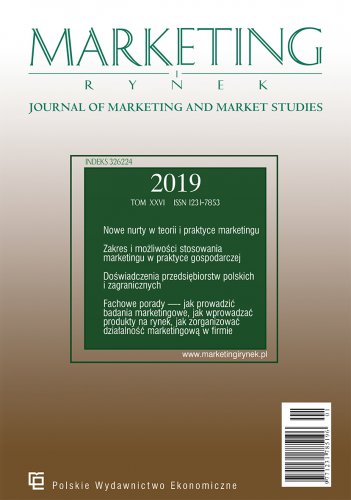Ocena skutków implementacji inteligentnych chatbotów w aspekcie zarządzania zasobami ludzkimi
Chatboty, wraz z rozszerzeniem ich wachlarza możliwości, zyskują coraz większą popularność na rynku oprogramowania. Sztuczna inteligencja stanowi coraz częściej implementowany element wirtualnych asystentów, co otwiera drogę do realizacji coraz bardziej złożonych zadań. Przedsiębiorstwa, które wykorzystują potencjał wynikający ze wzbogacenia struktur organizacji o takie rozwiązania, obserwują przeważająco pozytywny wpływ na procesy zachodzące w firmie. W oparciu o analizę udokumentowanych przypadków wdrożeń tego typu oprogramowania, niniejszy artykuł ma na celu odpowiedzenie na pytanie: jak znaczący wpływ na zarządzanie zasobami ludzkimi w przedsiębiorstwie ma implementacja chatbotów wykorzystujących sztuczną inteligencję?
Bibliografia
Business Insider Intelligence. (2016). 80% of businesses want chatbots by 2020. Business Insider. Pozyskano z https://www.businessinsider.com/80-of-businesses-want-chatbots-by-2020-2016-12?IR=T
Efron, L. (2016). How A.I. Is About To Disrupt Corporate Recruiting. Forbes [online]. Pozyskano z https://www.forbes.com/sites/louisefron/2016/07/12/how-a-i-is-about-to-disrupt-corporate-recruiting/#b52b67b3ba22
Fatima, A., Fatima, N., Parveen, N., Murthy, R. i Reddy C.K.K. (2019). Survey on web based conversational chatbot design. Journal of Applied Science and Computations, VI, 477–488. Pozyskano z http://www.j-asc.com/gallery/42-sp3-jan-2019.pdf
Freeman, D. (2016), Next IT Intelligent Assistant for Amtrak Wins Global Award for Best Consumer Application of AI, Business Wire [online]. Pozyskano z https://www.businesswire.com/news/home/20160120005909/en/Intelligent-Assistant-Amtrak-Wins-Global-Award-Consumer
Gartner. (2018). Analysts Present Top Predictions for Customer Experience Leaders at the Gartner Customer Experience Summit. Tokyo: Gartner. https://doi.org/10.1016/j.annals.2006.10.005
Gartner. (2019). Future of work: How HR can prepare for tomorrow’s workforce. Gartner.
Hodges, A. (2009). Alan Turing and the Turing Test. W: R. Epstein, G. Roberts i G. Beber (red.), Parsing the Turing Test Philosophical and Methodological Issues in the Quest for the Thinking Computer (s. 123–22). Springer. https://doi.org/10.1007/978-1-4020-6710-5_2
Jongerius, C. (2018). Quantifying Chatbot Performance by usingData Analytics. Utrecht University. Pozyskano z https://research.infosupport.com/wp-content/uploads/2019/05/Quantifying-Chatbot-Performance-by-using-Data-Analytics-Master-Thesis-Cas-Jongerius.pdf
Lausen, S. (1997). Usability Engineering in Industrial Practice. W: Human-Computer Interaction INTERACT ’97 (s.15–22). IFIP TC13 International Conference on Human-Computer Interaction, Sydney. https://doi.org/10.1007/978-0-387-35175-9_4
Luo, X., Tong, S., Fang, Z. i Qu, Z. (2019). Machines versus Humans: The Impact of AI Chatbot Disclosure on Customer Purchases. Temple University. https://doi.org/10.1287/mksc.2019.1192
Mantzaris, K. i Myloni, B. (2018). Human Resources and Workplaces of Tomorrow. Referat wygłoszony na: International Conference on Business and Economics. Hellenic Open University. Pozyskano z https://www.researchgate.net/profile/Konstantinos_Mantzaris/publication/325146454_Human_Resources_and_Workplaces_of_Tomorrow/links/5c2e169a92851c22a358150f/Human-Resources-and-Workplaces-of-Tomorrow.pdf
Market Research Future. (2019). Chatbots Market Research Report – Global Forecast 2023. Market Research Future.
Mindshare. (2016). Humanity in the machine. Mindshare UK. Pozyskano z https://www.mindshareworld.com/sites/default/files/MINDSHARE_HUDDLE_HUMANITY_MACHINE_2016_0.pdf
Peras, D. (2018). Chatbot evaluation metrics: review paper. W: R. Veselica, G. Dukic i K. Hammes (red.), Economic and social development (s. 89–97). Varazdin Development and Entrepreneurship Agency. Pozyskano z: https://www.researchgate.net/profile/Tomasz_Studzieniecki/publication/329717703_Wealth_or_happiness_of_the_European_union-_the_dilemma_of_the_normative_economics/links/5c17f64892851c39ebf51ea3/Wealth-or-happiness-of-the-European-union-the-dilemma-of-the-normative-economics.pdf#page=89
Schwab, K. (2016). Industry 4.0 – networked, adaptive production. Aachen, Niemcy: Frauhofer Institute for Production Technology. Pozskano z https://www.semanticscholar.org/paper/The-Fourth-Industrial-Revolution-Schwab/b2add02d066a1b91810284e549d80fc71df357d3
Statista. (2019a). Leading social media platforms used by marketers worldwide. Statista. https://doi.org/10.5260/cca.199318
Statista. (2019b). Most popular social networks worldwide. Statista. Pozyskano z https://doi.org/10.5260/cca.199318
Walker, M., Litman, D., Kamm C. i in. (1997). PARADISE: A Framework for Evaluating Spoken Dialogue Agents. Proceedings of the 35th Annual Meeting of the Association for Computational Linguistics. https://doi.org/10.3115/976909.979652

